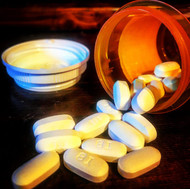Ibuprofen Side Effects Linked to Negative Impact on Testicles
Oct 24, 2021
A recent study in the Journal Proceedings of the National Academy of Sciences indicates a negative impact on the testicles of young men, caused by ibuprofen side effects. Ibuprofen is a non-steroidal anti-inflammatory (NSAID) used to reduce fever and treat minor aches and pains. It is sold commonly under the brand names Motrin® and Advil®. In 2014, combined sales for Advil and Advil PM were $572.7 million and $53.6 million for Motrin IB, according to a Statista report.
Ibuprofen Side Effects on Young Men
The study in question involved 31 young men between the ages of 18 and 35. Of the participants, 14 were given 600 milligrams of Ibuprofen twice a day. This is not more than a normal dose for an active athlete with aches and pains. The other 17 were given a placebo. In just two weeks, researchers had determined that the ibuprofen group was experiencing a decrease in testosterone. They also experienced the onset of a hormonal condition called “compensated hypogonadism.”
Effects of Ibuprofen on Male Babies
The study follows on the heels of research conducted to evaluate the health effects of three mid pain relievers when taken by pregnant women. Early results showed that all three affected the testicles of male babies. One of these medications was ibuprofen. The other two were aspirin and acetaminophen. They are now considered “anti-androgenic,” which means that they disrupt male hormones. Babies were found especially sensitive in the first trimester. Because of these results, researchers wanted to see what effect would be had on male adults.
What is Compensated Hypogonadism?
Compensated hypogonadism is a condition that can be linked to low fertility, depression and increased risk for heart failure and stroke. The condition occurs when men have normal levels of testosterone, but higher levels of luteinizing hormone. This results in a decrease in the ratio of testosterone to luteinizing hormone, causing an imbalance. Researchers are confident that the ibuprofen side effects on the study group are reversible since the frequent intake of the medication was short term.
Other Research Regarding Side Effects of NSAIDS
Research surfaced in early 2017 regarding findings that high doses of NSAIDS increased risks of cardiovascular events. The general increase in risk could be up to 30% higher. Ibuprofen side effects in particular could potentially double the risk. NSAID users were also more likely to have intestinal bleeding, which is a noted side effect.
According to Erma Z. Drobnis, an associate professional practice professor of reproductive medicine and fertility at the University of Missouri, Columbia, "There is evidence that some medications are particularly harmful to the male reproductive system, including testosterone, opioids, antidepressants, antipsychotics, immune modulators and even the over-the-counter antacid cimetidine (Tagamet).”
Natural Alternative Approaches
In December 2017 the World Health Organization reported that there have been no adverse outcomes, but several medical applications for cannabidiol (CBD). The report stated that naturally occurring CBD is well-tolerated in humans and animals. It is safe and not associated with any negative public health effects. CBD is also non-addictive. Research is still being conducted to scientifically verify many potential benefits.
There are a number of alternatives to NSAIDS and other pharmaceuticals. Holistic approaches such as acupuncture, massage therapy, herbal remedies and others have shown beneficial for many people. If you are concerned about potential side effects of laboratory manufactured health management, talk to your doctor about taking a different approach.
Note- Keep in mind that there is little to no evidence suggesting that responsible use of Ibuprofen, and NSAIDS in general, at the recommended levels will cause you harm. Just remember the potential risks next time you head to the medicine cabinet.


